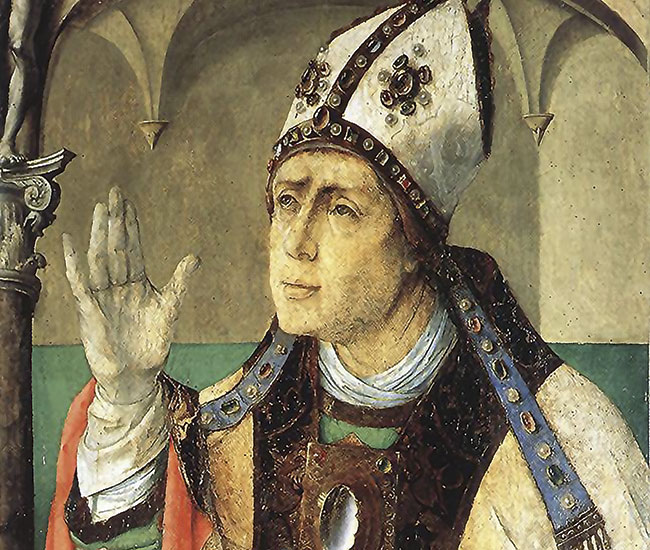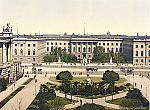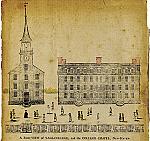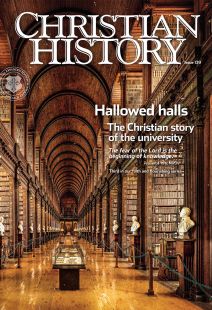Christian History Timeline: Godly learning, godly teaching

[ABOVE—Justus van Gent, St Augustine Oil on wood c. 1474—Musée du Louvre, Paris / [Public domain] Wikimedia]
— 397-426 Augustine writes On Christian Doctrine.
— Early 400s Seven liberal arts are explicitly codified in On the Marriage of Philology and Mercury by Martianus Minneus Felix Capella.
— Early 500s The word quadrivium begins to be used for the four “upper” liberal arts—music, arithmetic, geometry, and astronomy.
— c. 524 Boethius defends classical education in The Consolation of Philosophy.
— 782 Alcuin takes charge of Charlemagne’s palace school, where he guides an educational renaissance.
— Early 800s The word trivium begins to be used for the three “lower” liberal arts—grammar, logic, and rhetoric.
— 1088 The University of Bologna is founded.
— c. 1096 The University of Oxford begins.
— c. 1150 The University of Paris begins. Peter Lombard compiles the Sentences, the standard medieval theology textbook.
— 1185 Herrad of Landsberg completes her encyclopedia, The Garden of Delights.
— 1209 Some Oxford students and professors found their own university in Cambridge.
— 1210 The first of three condemnations is issued against the theology faculty of the University of Paris banning ideas connected to Aristotle’s philosophy; other condemnations will come in 1270 and (most famously) in 1277.
— 1347 Emperor Charles IV establishes the University of Prague.
— Early 1400s Teachings of John Wycliffe and Jan Hus, and a dispute over rival popes, cause controversy at Prague.
— 1409 Decree of Kutná Hora gives decisive control of the University of Prague to its Bohemian faction. German students and professors leave and found a new university at Leipzig.
— 1502 Frederick the Wise of Saxony establishes the University of Wittenberg.
— 1508 Martin Luther is invited to teach at Wittenberg; his presence there will make it a center of the Protestant Reformation.
— 1529 Erasmus publishes On the Teaching of Boys.
— c. 1600 In Shakespeare’s famous tragedy Hamlet, the titular character attends Wittenberg.
— 1636 Harvard is founded.
— 1690 Friedrich of Brandenburg calls Christian Thomasius to Halle to found a new university.
— 1692 August Francke arrives in Halle, where he will serve as professor of Greek and Hebrew.
— 1694 The University of Halle officially opens.
— 1701 Yale is founded.
— 1725 Giambattista Vico writes a compendium of the humanities called New Science.
— 1787 A revival breaks out at Hampden-Sydney College in Virginia that will ultimately seed the Second Great Awakening.
— 1791 French revolutionaries close the University of Paris.
— 1798 Immanuel Kant writes Conflict of the Faculties.
— 1802 A famous revival begins at Yale.
— 1806 Napoleon reopens Paris as the University of France.
— 1809 The University of Berlin is founded under a new approach that makes universities centers for professionalized research.
— 1817 Halle and Wittenberg merge.
— 1828 The Yale Report reaffirms the value of classical education and Christian civilization.
— 1833 Oberlin College is founded.
— 1834 The abolitionist “Lane Rebels” merge with Oberlin. That same year Oberlin begins admitting Black students on the same basis as Whites.
— 1835 Charles Finney comes to Oberlin as a professor; he will become president in 1852.
— 1852 John Henry Newman writes The Idea of a University.
— 1860 Jonathan Blanchard founds Wheaton as an abolitionist college.
— 1865 Cornell, the youngest Ivy League school, is founded.
— 1871 In the Universities Test Act, the U.K. Parliament removes the qualification that students and professors at Oxford, Cambridge, and the University of Durham must belong to the Church of England.
— 1870s Oberlin begins to require segregation of the races on campus.
— 1886 College students begin the Student Volunteer Movement.
— 1919 Charles Blanchard, president of Wheaton, drafts the doctrinal statement for the World’s Christian Fundamental Association.
— 1920s Yale begins the Religion in Higher Education Program.
— 1935 Dorothy L. Sayers publishes Gaudy Night.
— 1943 C. S. Lewis publishes The Abolition of Man.
— 1945 Lewis publishes That Hideous Strength, set in part at a college. He will later address the topic of education in his Narnian works.
— 1947 Dorothy L. Sayers publishes “The Lost Tools of Learning.”
— 1955 The Wheaton Philosophy Conference begins.
— 1964 Princeton stops requiring chapel attendance, the last Ivy League school to do so.
— 1965 Clyde Kilby founds the Wade Center at Wheaton.
— 1970 A famous revival erupts at Asbury College in Kentucky; the University of Paris is closed and divided into 13 separate schools.
— 1976 38 evangelical colleges found the Council for Christian Colleges and Universities (CCCU).
— 1978 The Society of Christian Philosophers is founded.
— 1994 Mark Noll publishes The Scandal of the Evangelical Mind.
By the editors
[Christian History originally published this article in Christian History Issue #139 in 2021]
Next articles
Fruits of the ivy vine
The Ivy league schools aimed for the common good of a new nation
Benjamin P. LeavittSupport us
Christian History Institute (CHI) is a non-profit Pennsylvania corporation founded in 1982. Your donations support the continuation of this ministry
Donate







